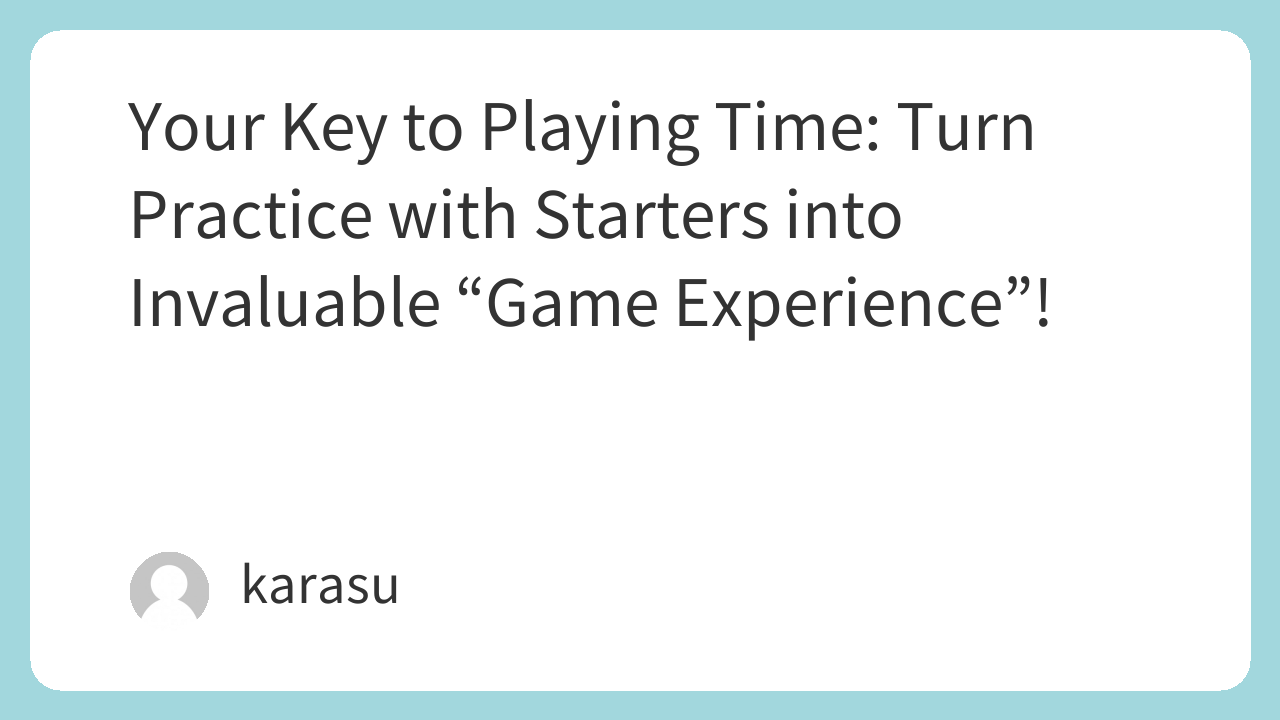To all handball players striving for a spot on the court,
If you’re currently finding limited opportunities for games and often play the role of an opponent for your team’s starting players in practice, that’s actually your greatest advantage. While it might feel frustrating at times – “I want to play in games too!” – this environment is, in fact, an excellent opportunity to dramatically improve your handball skills and gain crucial “game experience.”
This article will delve into specific ways you can maximize this valuable practice time, learn from the regular players, and ultimately earn your chance to play in actual games.
Shifting Your Mindset: From “Opponent” to “Growth Opportunity”
The most crucial step is to adjust your mindset. Stop viewing your role as merely an “opponent” or a practice dummy for the starters. From today, consider this practice as “high-intensity, high-quality, game-simulated private coaching.”
Think about it. You get to play with the most skilled players on your team every day, at game speed and under pressure. This is a privilege many players only dream of. You can feel their every move firsthand and learn firsthand the secrets to their success in games.
Simply by adopting this mindset, the insights you gain from the same practice sessions will change dramatically.
Concrete Strategies to “Steal Experience” from Starting Players
So, how exactly can you “steal experience” from the starting players and make it your own?
1. Observe and Anticipate Their “Decisions” Thoroughly
Starting players excel at making quick decisions during games.
- During Offense:
- When, where, and what kind of pass do they make?
- Why do they shoot at that specific moment?
- When and how do they execute their fakes?
- How do they adjust their attack based on the defender’s movements?
- Your Task: Practice anticipating their moves to cut off passing lanes or block shots. Even if your prediction is wrong, reflect on why it was wrong and apply that lesson next time.
- During Defense:
- How do they coordinate with teammates when defending?
- How do they guide opponents in 1-on-1 defense?
- What is their positioning for shot blocks?
- Your Task: When they are defending, try to sense how they react to your movements. Learn about the “weaknesses” in your own movements and their “next predictions” from their perspective.
2. Articulate “Why It Worked/Didn’t Work” in the Moment
During practice, if you feel a play was effective, or conversely, if you felt completely outmaneuvered, mentally pause and analyze it.
- Example: “Why couldn’t I stop that shot?”
- Was the shot trajectory perfect?
- Was their step too fast for me to block in time?
- Was the defense already broken down in that situation?
- Example: “Why didn’t that pass connect?”
- Was the timing of the pass too late?
- Did I fail to see my teammate’s run?
- Did the defender read my pass?
Repeatedly asking “why?” will develop your ability to articulate and analyze plays. This is a critical skill for making split-second decisions in actual games.
3. Actively Seek Feedback
After practice or during breaks, be brave and ask the starting players or coaches questions.
- “How could I have defended that better?”
- “Was the timing of that pass correct?”
- “What specifically should I strengthen to get more playing time?”
They possess more experience and knowledge than you. Their specific advice will be an invaluable source of information to accelerate your growth. Don’t hesitate; eagerly seek out every learning opportunity.
4. Clearly Identify Your “Strengths” and “Weaknesses”
Facing off against starting players will highlight your effective plays, what works, and what you still need to improve.
- Your Strengths: Note down any aspects that you felt were effective even against starters, such as speed, agility, specific fakes, or tenacious defense. These are your unique qualities and the points you should emphasize when vying for playing time.
- Your Weaknesses: Understand precisely what situations cause you problems, such as losing out due to body size, frequent passing errors, or hesitation in decision-making. Then, devise specific training routines to overcome these weaknesses and incorporate them into your daily individual practice.
Conclusion: Utilize Your Best Resource and Gain Confidence
Your current situation of “limited playing opportunities” is by no means a handicap. On the contrary, it’s a privilege to learn in a top-tier environment. Practicing against starting players is your ultimate textbook, a living guide.
By maximizing this valuable time, “stealing experience” from their plays, analyzing your own performance, and actively seeking feedback, you will undoubtedly grow and seize your chance to play in games.
Don’t give up; make the most of this “greatest advantage” right in front of you. Your efforts will surely pay off.



コメント